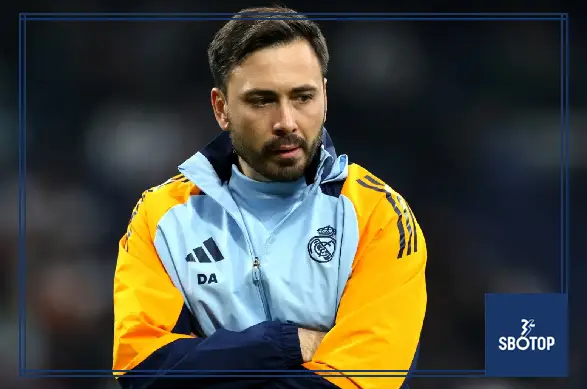For over a decade, Davide Ancelotti has been the ever-present figure beside his father, legendary manager Carlo Ancelotti, on some of football’s grandest stages—from Paris to Munich, from Madrid to Rio. Always clad in club apparel, often seen quietly whispering into Carlo’s ear during matches, Davide has evolved into more than just an assistant coach. He has grown into a tactician in his own right, a bridge between generations, and a modern mind behind a classical footballing figure.
Now, in 2025, the younger Ancelotti is finally poised to take center stage. After years of apprenticeship under one of the most decorated managers in the game, reports strongly suggest that Davide is ready to accept his first full managerial role. Several mid-tier European clubs, particularly in Italy and France, are said to be in advanced discussions with the 35-year-old.
Davide’s departure from his father’s shadow marks a significant shift not just in his own career, but also in the broader narrative of coaching succession. For all his exposure, experience, and academic preparation, Davide still has one mountain left to climb: proving that his footballing acumen can stand alone.
A Career Built in the Shadows of Giants
Born in Reggio Emilia in 1989, Davide Ancelotti’s path into professional football was almost preordained. As the son of Carlo Ancelotti—a Champions League-winning player and later three-time Champions League-winning manager—Davide grew up on training grounds, in locker rooms, and inside the beating heart of elite football institutions.
He began his playing career modestly, featuring in AC Milan’s youth setup and eventually turning out for clubs like Borgomanero in Italy’s lower leagues. But it quickly became clear that Davide’s destiny lay not on the pitch but beside it.
While studying Sports Science at the University of Parma, Davide simultaneously pursued UEFA coaching qualifications. By 2012, aged just 23, he had already joined Paris Saint-Germain’s coaching staff as a fitness coach—Carlo’s fitness coach. That set the pattern for the next decade:
- Paris Saint-Germain (2012–2013)
- Real Madrid (2013–2015, 2021–2024)
- Bayern Munich (2016–2017)
- Napoli (2018–2019)
- Everton (2019–2021)
- Brazil National Team (2024–present)
At each stop, Davide matured, gaining tactical insight, learning languages, navigating dressing room politics, and evolving with the game. While nepotism accusations lingered early in his career, many players and insiders have since spoken openly about Davide’s contributions, often describing him as the “analytical brain” to Carlo’s intuitive genius.
Davide’s Style Modern Thinker with a Calm Demeanor
Where Carlo Ancelotti is known for his player-first management style and adaptability, Davide brings a more modern, data-driven approach. According to several former Real Madrid players, Davide’s match preparation presentations are meticulous—full of video breakdowns, tactical variations, and opponent-specific strategies.
Sources close to the Real Madrid camp describe a clear division of labor: Carlo provides the motivational framework, reads the squad dynamics, and sets the emotional tone. Davide, meanwhile, handles the granular details—pressing triggers, transition phases, set-piece patterns, and positional rotations.
During Real Madrid’s 2022–2023 Champions League campaign, it was Davide who reportedly designed the compact pressing structure that neutralized Manchester City’s midfield in the first leg of their semi-final.
He’s also known for his openness to sports science, psychology, and player individuality. He advocates personalized fitness regimes, mental coaching tools, and fostering collaborative environments rather than hierarchical ones.
Davide’s footballing ideology blends classic Italian defensive organization with modern possession-based progressions—think of a hybrid between Pep Guardiola’s verticality and Luciano Spalletti’s positional rotations.
The Brazil Experience A Crash Course in Culture and Chaos
When Carlo Ancelotti accepted the role of Brazil national team head coach in mid-2024, it raised eyebrows. Many questioned whether a European manager—albeit a legendary one—could truly navigate the cultural complexities and passionate expectations of Brazilian football. Davide, once again, followed.
But what started as an assistive journey soon turned into a baptism of fire.
Brazil’s national setup, famously decentralized and politically intense, gave Davide a firsthand view of how national allegiances, media pressure, and structural inefficiencies shape football at the highest level. With a language barrier to overcome and South American football’s chaotic tempo to absorb, Davide was thrust into an entirely different kind of challenge.
Still, he embraced it. He reportedly took the lead in designing training sessions in Teresópolis, engaged directly with young players like Endrick and João Gomes, and coordinated scouting reports for opponents during the 2024 Copa América and 2026 World Cup qualifiers.
Though Brazil’s Copa América campaign ended in a semi-final loss to Argentina, insiders say it was Davide who calmly rallied the dressing room post-defeat. The experience hardened him—mentally and emotionally—and gave him crucial exposure to managing egos, expectations, and failure.
Stepping Into the Spotlight Opportunities and Expectations
With his credentials established and his tactical voice maturing, Davide Ancelotti is now reportedly on the cusp of managerial independence. Several clubs have approached him with concrete offers, including:
- Lille OSC (France) – A club known for developing youth and selling big. Ideal for a coach with tactical depth and patience.
- Fiorentina (Italy) – A sleeping giant with a passionate fanbase and expectations of European qualification.
- Real Betis (Spain) – A technical, possession-based team that may offer stylistic synergy with Davide’s football ideology.
Each of these clubs presents unique challenges: language, pressure, squad overhaul needs, or financial limitations. But Davide appears ready, and according to reports, Carlo himself is encouraging his son to finally go solo.
Carlo recently told La Gazzetta dello Sport:
“Davide has learned from the best—not just me. He’s worked with champions and against champions. He has his own ideas, his own identity. I think the time has come.”
Legacy and Pressure Being Ancelotti’s Son Isn’t Easy
Of course, Davide’s last name is both a blessing and a burden. For every door it opens, it invites a spotlight and scrutiny that few other rookie managers face. Comparisons will be inevitable. Every formation, substitution, and post-match comment will be contrasted with “what Carlo would have done.”
The risk isn’t just professional—it’s personal. Can Davide truly carve a distinct identity, or will he forever be seen through the lens of his father’s legacy?
Yet, many in football circles believe Davide has already made that leap. Former Bayern midfielder Xabi Alonso, now a manager himself, once noted:
“Davide is not just ‘Carlo’s son.’ He’s a serious thinker of the game. He has his own voice. When he speaks, people listen—not out of respect for his father, but for him.”
This validation from peers, combined with Davide’s extensive top-tier experience, sets him apart from other first-time managers.
Also Read:
- SBOTOP: Arsenal Face Rodrygo Transfer Tug-of-War as PSG Plot Move to Bolster Galáctico-Style Frontline
- SBOTOP Zubimendi Embraces Arsenal Challenge: Spain Star’s Quiet Move Could Prove the Catalyst for Gunners’ 2025 Glory Push
- SBOTOP: From Small Beginnings to Grand Ambitions: The Inspiring Journey of Coach Seng Zoe










